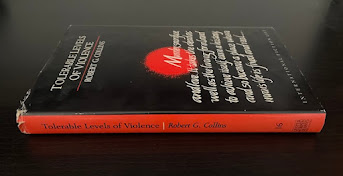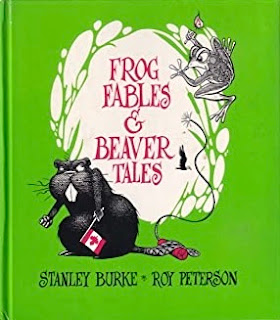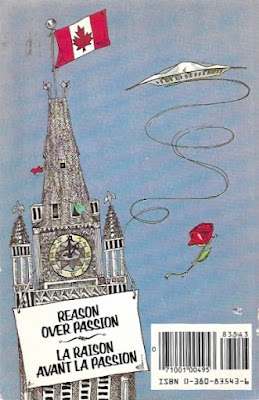[Lorraine Monk, ed.]
Toronto: McClelland & Stewart, 1976
Who knows what tomorrow might bring.
A “gift from all Canadians to their American neighbours on the occasion of their Bicentennial,” Between Friends/Entre amis is a relic of a friendlier time. As much a part of my adolescence as electric carving knives and ovens of harvest gold, it seemed a fixture of every other suburban Montreal coffee table. That it did not sit on ours has everything to do with family history.
Don't ask.
Until last month I'd never so much as held Between Friends/Entre amis. Having now done so, I can report that it is extremely heavy – seven pounds – making it by far the weightiest tome in my collection. Interestingly, it is both the most expensive and one of the cheapest. The pre-publication price was $29.50, which the Bank of Canada Inflation Calculator informs is roughly equivalent to $149.00 today.
The second printing was $42.40 (over $214.00 today).
There were three printings in total.
Now you can own a cherished First Edition of the gift book our Prime Minister [sic] will present to the President of the United States next month.The text-heavy hard sell concludes:
And it is no secret that first edition copies of BETWEEN FRIENDS/ENTRE AMIS should increase in value as the years go by, not only as a magnificent memento of the peaceable border but also as a real collector’s heirloom.
First edition copies of “Canada: Year of the Land” produced for the 1967 Centennial by the same dedicated team at the National Film Board have already increased in value from $25 to as much as $600!
Order a copy for yourself. Order one for each of your children, for friends and relatives in the United States or back home. Order copies for customers and business associates.A few words of caution for those seeking investment opportunities: Between Friends/Entre Amis can be purchased online today for less than four dollars. Canada: Year of the Land can be had for even less.
Like Canada: Year of the Land, Between Friends/Entre amis was a project of the National Film Board. It received $1.1 million in funding. The concept was quite simple: dispatch photographers across the country to capture images of the border, border towns, border crossings, and the people who lived in the vicinity. More than sixty thousand photos were taken, of which 221 made it into the book. There are landscapes and images livestock, general stores, bars, churches, farmers, boy scouts, and police officers, along with the obligatory shot of the CN Tower. Every few pages, there is a photo of the border itself. These make for the most striking images, particularly along the 49th parallel, often captured as a thin scar running across an otherwise untouched wilderness.
Just who are these people?
Mr. Charles R. Diebold (left); Mrs. Charles R. Diebold (seated, left); Mrs. Charles Diebold III, Mr. Charles Diebold III, Mr. Peter DeW. Diebold, Mr. David K. Diebold (standing left to right); Mrs. David K. Diebold (seated, right). The senior Mr. Diebold is President and Chief Executive Officer of the first Empire State Corporation. Mr. Charles Diebold III is President of the Western Savings Bank in Buffalo.Turning the page, we find two more photographs by Christopher. The first, also taken in Buffalo, is a blurred image of a stripper in mid-performance. Its note reads:
Buffalo has more than 100 nightclubs. It also has its own symphony orchestra, a well-known art gallery, several fine restaurants (one on the site of the house in which Mark Twain, the United States writer, lived in 1870, when he was newly married and part owner of the Buffalo Express), and a zoo.
Well, it was.
That photo is as gritty as it gets. There are images of great wealth, but none of extreme poverty. There are photographs of order and authority but not protest. It is a polite collection from a polite people.
 |
| The Rotarian, April 1977 |
One of your famous poets, Robert Frost, talked about good fences making good neighbours. Well, in this case, it is the good neighbours that make good boundaries.President Ford thanks the prime minister for “this beautiful Bicentennial gift between friends,” talks at length about the pride Americans have in the boundary as one of peace, and concludes:
It is a boundary that will be crossed this summer by many people from Canada coming to the United States for our Bicentennial, and it is a boundary that will be crossed by many Americans going to the Montreal Olympics. And I think both occasions are great occasions for the Canadians as well as for the Americans.The two leaders next went to the Rose Garden, where editor Lorraine Monk provided an overview.
Consider the dates. Where changes in the relationship with our American cousins were once slow moving, consequential change now occurs in the time it takes to heft a seven-pound book to a cash register.
Between Friends/Entre amis was on our coffee table for as long as it took to write this piece. It now sits in a box in our unheated garage. A first printing, it set me back 65 cents. The thrift store in which it was purchased is one of several in Brockville. Itself a border community, it was named after Sir Isaac Brock, one of the great heroes of the War of 1812, a conflict that the book takes care to avoid. Brockville is worth a visit. When I have time, I like to go down to St Lawrence Park and look out over the water. The American shore is less than two kilometres away. The border runs down the centre of the river. You can’t see it, but it is reassuring to know that it is there.
Update:
Used copes are plentiful. Online offerings range in price from $3.99 to $886.57.
Condition is not a factor.



















































